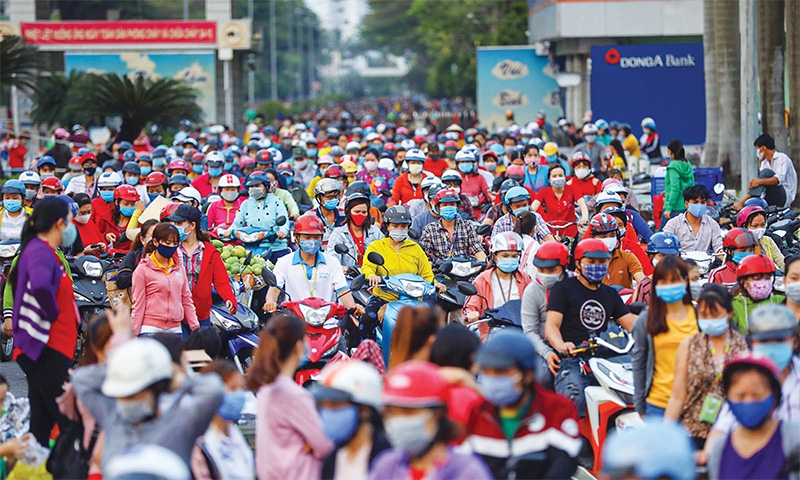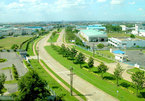 |
| Industrial workers are under pressure to make ends meet while nationwide shutdowns remain in place, Photo: Huu Khoa |
Despite Samsung Vietnam designing partitions to prevent droplets between workers to improve safety levels during the coronavirus outbreak, it was recently forced to close a workshop in its factory in the northern province of Bac Ninh altogether after a single worker tested positive for COVID-19.
In another case, Pouyuen Vietnam, a major branded athletic and casual footwear producer and manufacturer for brands such as Nike and Adidas, suspended production on April 14-15 after local authorities cited that the company, which has dozens of thousands of employees and operates three shifts a day, failed to ensure that its workers obeyed current distancing regulations.
The unexpected issues for these giant enterprises continue to put more pressure on those trying to protect business as well as enforcing close monitoring measures at industrial zones (IZ). Foreign-invested enterprises (FIEs), especially labour-intensive ones, are faced with the highest level of risks in IZs, where thousands of people work every day.
FIEs hit hard
Samsung Vietnam, one of the key drivers of export growth, is to cut its export target for 2020 by 12.7 per cent against 2019 and expects a loss of $5.8 billion in trade. The US and EU markets, which make up over 50 per cent of Samsung Vietnam’s export value, saw sharp reductions in demand after the coronavirus crisis fully hit, according to a Ministry of Industry and Trade report sent to the prime minister earlier this month.
The total investment from the South Korean group in Vietnam is more than $17 billion, of which Samsung Electronics accounts for $9.5 billion with its first mobile phone factory in Bac Ninh opened in 2008, followed by a second factory in the neighbouring province of Thai Nguyen, and a production complex for televisions and home appliances in Ho Chi Minh City, as well as a research and development centre in Hanoi currently under construction.
Last year, telephones and components were the leading category in Vietnam’s export turnover with an estimated $51.8 billion, mostly contributed by Samsung.
Up to now, the coronavirus crisis has caused temporary factory closures and imminent layoffs for a series of FIEs including Panasonic Appliances, Japanese bathroom product manufacturer ToTo, and carmakers Honda, Toyota, and Ford. Meanwhile, the textile and garment sector complained that it is experiencing the hardest troubles since the Asian economic crisis of 1997 and the global financial crisis 12 years ago.
Nicolas Audier, chair of the European Chamber of Commerce in Vietnam recently told VIR that the business community around the world is facing unprecedented challenges caused by the pandemic, and that those in Vietnam are no different. He cited 90 per cent of European businesses in Vietnam as saying they are hit by the virus, according to the latest Business Climate Index for the first quarter of 2020 released on April 8.
Goods imported to EU member states and to the United States are being significantly affected by delays, cancellations or cuts, Audier added. In addition, intra-regional transportation is also more or less affected by a number of countries tightening border control in the context of the global health emergency.
FIEs contribute the lion’s share of Vietnam’s export growth, but they witnessed an on-year downturn of 15.4 per cent in March, while domestic ones decreased by 3.7 per cent. In 2019, FIEs earned $181.35 billion including crude oil exports, accounting for 68.8 per cent of the export turnover.
It is believed that previously-made targets across the board for economic growth and a target of $300 billion in export turnover for 2020 will be difficult to achieve in the face of various external factors.
“Up to now, the Vietnamese government is controlling things very well. The worries are not from infection but mainly through the slowdown in exports, which may impact employment rates if the situation continues for a longer time,” Sami Kteily, CEO of PEB Steel told VIR.
All key sectors contributing to Vietnam’s major exports, led by electronics, textiles, footwear, and furniture, have been heavily affected by the pandemic, resulting in a sharp decline in orders, with workers being laid off due to a serious shortage of jobs. The number of orders in April and May for textiles and footwear will likely be reduced by about 70 per cent, while new orders from June onwards have yet to be negotiated and recovering orders until the end of 2020 seems unlikely.
Reeling to protect
Prime Minister Nguyen Xuan Phuc called now a crucial time to contain the spread of the coronavirus in Vietnam, while enforcing stricter measures as well as prioritising safety. Nevertheless, the PM did not forget to mention the protection of production.
IZs are trying their best to protect such enterprises, especially in labour-intensive areas. According to statistics, Hanoi currently has 150,000 such workers alone.
At a meeting of the Steering Committee for Prevention and Control of COVID-19 in Hanoi last week, Vice Chairman of Hanoi People’s Committee Ngo Van Quy suggested that, based on the guidance of the city and the government, districts should strengthen the inspection of districts housing a large number of labour-intensive groups to ensure the dual goal of implementing epidemic prevention and developing production. “Enterprises in IZs must take measures to assign and arrange reasonable working hours for labourers and other workers so as to avoid large crowds during the pandemic,” said Quy.
Home to many IZs, Quang Ninh Economic Zones Management Authority said that it has closely co-ordinated with related industries and localities to actively prevent and control pandemic in IZs. Quang Ninh Party Committee has also set up working groups to visit areas to direct prevention and control measures, as well as implement a periodic reporting regime.
Meanwhile, Ho Chi Minh City People’s Committee issued Official Letter No.1249/UBND-VX for a scoring system for the assessment of COVID-19 infection risk at local businesses including FIEs in the city. It requires all operating enterprises and production establishments in export processing zones, IZs, high-tech parks, and in the city itself to conduct self-assessments according to the coronavirus risk assessment index. Besides this, the calculation of the infection risk index will be the basis for the final decision on whether an enterprise can be allowed to maintain business operations or to suspend them.
Dong Nai Industrial Zone Management Authority, which has surveyed around 450 manufacturers on the business impacts of the pandemic, pointed out that around 62 per cent of them have yet to create specific plans to ease the impacts of the crisis, and are only taking temporary measures. If the pandemic continues, it will lead to a prolonged shortage of materials, stagnant manufacturing and export activities, and potential layoffs, the authority said. VIR
Van Thu

Labor market freezes due to Covid-19
Large companies are not recruiting workers, while small and medium enterprises (SMEs) are laying off workers as they cannot maintain a big staff during the Covid-19 crisis.

VN's industrial realty still grows during pandemic
While many realty segments have suffered losses from the pandemic, industrial realty business have kept growing in Vietnam.
 As the country faces an unexpected economic crisis, industrial zones are reeling to protect enterprises vulnerable to diseases, especially those labour-intensive businesses that play an important role in the nation’s exports.
As the country faces an unexpected economic crisis, industrial zones are reeling to protect enterprises vulnerable to diseases, especially those labour-intensive businesses that play an important role in the nation’s exports.